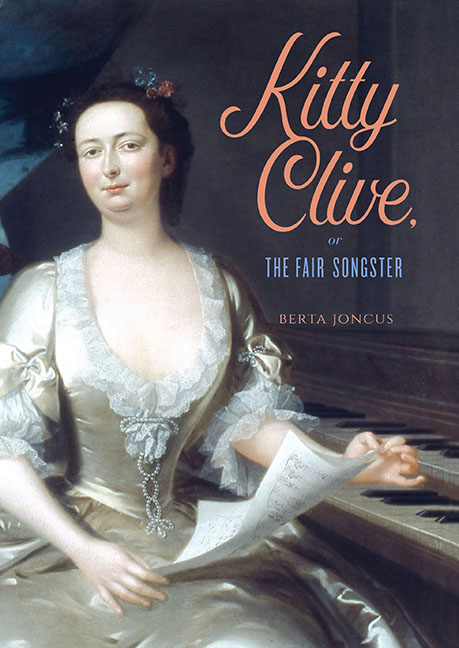Book contents
- Frontmatter
- Dedication
- Contents
- Illustrations
- Preface
- Conventions of Transcription
- 1 The Siren Song: Kitty Clive in the Playhouse
- 2 ‘The Lovely Virgin tun'd her Voice’: Henry Carey and the Production of a Native Songster
- 3 ‘Charm'd with the sprightly Innocence of Nell’: The Metamorphosis of Miss Raftor
- 4 ‘HINT writes, and RAFTOR acts in Drury-lane’: Clive, Fielding, and Theophilus Cibber
- 5 ‘The pious Daughter, and the faithful Wife’: Fielding, Miller, and Clive, 1733–35
- 6 ‘A Likeness where none was to be found’: Contested Images of Clive, 1734–37
- 7 The Patriot Soprano: British Worthies at Drury Lane
- 8 Handel and the Sweet Bird of Drury Lane, 1740–43
- 9 The Case of Mrs. Clive
- 10 Of Scuffles and Rivalries: The Demise of ‘Kitty Cuckoe’
- 11 From Miss Lucy to Mrs. Riot: Voice and Caricature
- 12 Clive on Clive: The Rehearsal: Or, Bays in Petticoats
- 13 Conclusion: The Fair Songster
- Appendix 1 Catherine Clive's Roles 1728–69
- Appendix 2 Lines in Catherine Clive's Repertory 1728–69
- Appendix 3 The Case of Mrs. CLIVE (1744)
- Select Bibliography
- Index
10 - Of Scuffles and Rivalries: The Demise of ‘Kitty Cuckoe’
Published online by Cambridge University Press: 20 September 2019
- Frontmatter
- Dedication
- Contents
- Illustrations
- Preface
- Conventions of Transcription
- 1 The Siren Song: Kitty Clive in the Playhouse
- 2 ‘The Lovely Virgin tun'd her Voice’: Henry Carey and the Production of a Native Songster
- 3 ‘Charm'd with the sprightly Innocence of Nell’: The Metamorphosis of Miss Raftor
- 4 ‘HINT writes, and RAFTOR acts in Drury-lane’: Clive, Fielding, and Theophilus Cibber
- 5 ‘The pious Daughter, and the faithful Wife’: Fielding, Miller, and Clive, 1733–35
- 6 ‘A Likeness where none was to be found’: Contested Images of Clive, 1734–37
- 7 The Patriot Soprano: British Worthies at Drury Lane
- 8 Handel and the Sweet Bird of Drury Lane, 1740–43
- 9 The Case of Mrs. Clive
- 10 Of Scuffles and Rivalries: The Demise of ‘Kitty Cuckoe’
- 11 From Miss Lucy to Mrs. Riot: Voice and Caricature
- 12 Clive on Clive: The Rehearsal: Or, Bays in Petticoats
- 13 Conclusion: The Fair Songster
- Appendix 1 Catherine Clive's Roles 1728–69
- Appendix 2 Lines in Catherine Clive's Repertory 1728–69
- Appendix 3 The Case of Mrs. CLIVE (1744)
- Select Bibliography
- Index
Summary
Doubts linger after the actor's revolt – Susannah Cibber seeks revenge – the Polly Row renewed – Peg Woffington at Drury Lane – ressentiments and tales of scuffles – Charles Burney gets the last word
Referring to Clive, the author of Theatrical Correspondence in Death quotes Virgil's Aeneid on the subject of Dido, Queen of Carthage: ‘Dux Fæmina facti’ – ‘A woman led the exploit’. These words preface the author's charges that Clive is ‘Self-Sufficient’, ‘Self-Conceited’, ‘Arrogant’, and ‘Insolent’. The author also denies her ‘Merit’: ‘what is her Merit, when compared and put in the Scale, with that of many her Predecessors?’ Even the generally pro-Clive creator of the print The Theatrical Contest labels her ‘self superior modest Kate’, suggesting that Clive's modesty is hokum. By the start of the 1745–46 season, ‘Kitty Cuckoe’ was no longer universally held to represent fine taste. The tipping point seems clearly to have been Fleetwood's account of her earnings, which while misleadingly presented was in fact fairly accurate. Disclosures about her leadership of the actors’ revolt further implicated her in unfeminine activities. Changing politics and stage fashions were also working against her. But it was Green Room tattle that would most overtly damage Clive's reputation over the next two seasons.
Celebrity culture feeds on the desecration of the star no less than on her veneration. As a known quantity with top earnings and professional clout, Clive now found that criticism of her flourished while praise dried up. Humiliation came in the form of Green Room ‘peeps’, or inside gossip. The Green Room, the performers’ backstage retiring space, defined rank and boundaries: only playhouse principals, high-level theatre personnel, and men of Quality were admitted. As the century and its celebrity marketing progressed, audience appetite for Green Room ‘peeps’ grew. Among the responses to this was Garrick's rehearsal comedy A Peep behind the Curtain (1767), featuring Clive as Lady Fuz. Yet decades earlier Clive was already the subject of this kind of story, which pretends to intimacy with the star, and carries the authority of events witnessed – whether or not they actually occurred. In Clive's case, revelations about her empowerment had whet popular appetite for stories about her aggressive nature; audiences lost their ear for Clive's sweet harmonies.
- Type
- Chapter
- Information
- Kitty Clive, or the Fair Songster , pp. 302 - 330Publisher: Boydell & BrewerPrint publication year: 2019



